含情态动词must的反义疑问句
(完整版)含有must时,反义疑问句的归纳
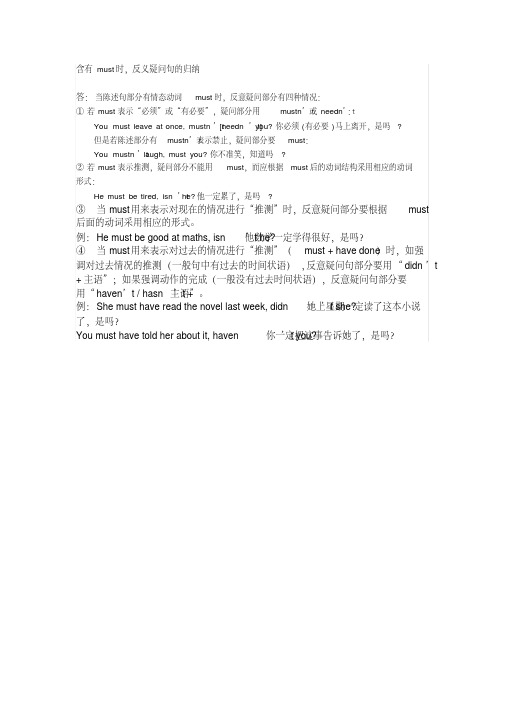
含有must时,反义疑问句的归纳
答:当陈述句部分有情态动词must时,反意疑问部分有四种情况:
:
①若must表示“必须”或“有必要”,疑问部分用mustn’t或needn’t
you?你必须(有必要)马上离开,是吗?
You must leave at once, mustn’t [needn’t]
但是若陈述部分有mustn’t表示禁止,疑问部分要must:
You mustn’t laugh, must you?你不准笑,知道吗?
②若must表示推测,疑问部分不能用must,而应根据must后的动词结构采用相应的动词
形式:
he?他一定累了,是吗?
He must be tired, isn’t
③当must用来表示对现在的情况进行“推测”时,反意疑问部分要根据must 后面的动词采用相应的形式。
他数学一定学得很好,是吗?
例:He must be good at maths, isn’t he?
④当must用来表示对过去的情况进行“推测”(must + have done)时,如强
调对过去情况的推测(一般句中有过去的时间状语),反意疑问句部分要用“didn’t + 主语”;如果强调动作的完成(一般没有过去时间状语),反意疑问句部分要
主语”。
用“haven’t / hasn’t +
她上星期一定读了这本小说例:She must have read the novel last week, didn’t she?
了,是吗?
你一定把这事告诉她了,是吗?
You must have told her about it, haven’t you?。
must的反义疑问句的用法
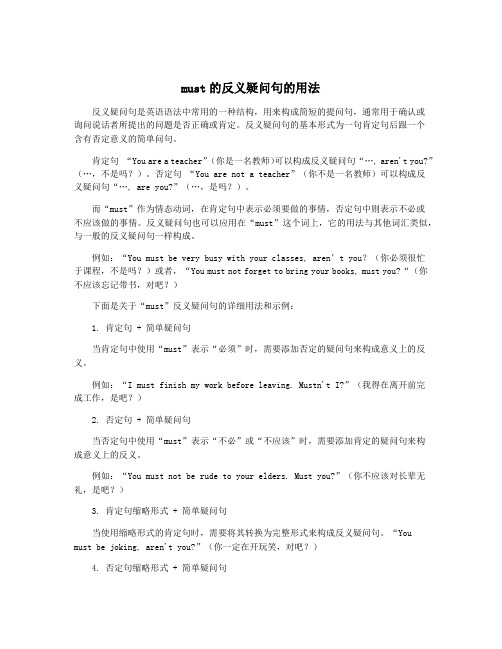
must的反义疑问句的用法反义疑问句是英语语法中常用的一种结构,用来构成简短的提问句,通常用于确认或询问说话者所提出的问题是否正确或肯定。
反义疑问句的基本形式为一句肯定句后跟一个含有否定意义的简单问句。
肯定句“You are a teacher”(你是一名教师)可以构成反义疑问句“…, aren't you?”(…,不是吗?)。
否定句“You are not a teacher”(你不是一名教师)可以构成反义疑问句“…, are you?”(…,是吗?)。
而“must”作为情态动词,在肯定句中表示必须要做的事情,否定句中则表示不必或不应该做的事情。
反义疑问句也可以应用在“must”这个词上,它的用法与其他词汇类似,与一般的反义疑问句一样构成。
例如:“You must be very busy with your classes, aren’t you?(你必须很忙于课程,不是吗?)或者,“You must not forget to bring your books, must you?“(你不应该忘记带书,对吧?)下面是关于“must”反义疑问句的详细用法和示例:1. 肯定句 + 简单疑问句当肯定句中使用“must”表示“必须”时,需要添加否定的疑问句来构成意义上的反义。
例如:“I must finish my work before leaving. Mustn't I?”(我得在离开前完成工作,是吧?)2. 否定句 + 简单疑问句当否定句中使用“must”表示“不必”或“不应该”时,需要添加肯定的疑问句来构成意义上的反义。
例如:“You must not be rude to your elders. Must you?”(你不应该对长辈无礼,是吧?)3. 肯定句缩略形式 + 简单疑问句当使用缩略形式的肯定句时,需要将其转换为完整形式来构成反义疑问句。
“You must be joking, aren't you?”(你一定在开玩笑,对吧?)4. 否定句缩略形式 + 简单疑问句当使用缩略形式的否定句时,需要将其转换为完整形式来构成反义疑问句。
情态动词must 的反意疑问句

含有must 的反意疑问句1. must表示“必须、禁止“时,反意疑问部分要用must (mustn’t) 。
You mustn’t stop your car here, must you?你不能把车停在这地方,知道吗?2. must表示“有必要”时,反意疑问句部分要用needn’t。
They must finish the work today, needn’t they?他们今天必须要完成这项工作,是吗?3.must 表推测时a.对现在情况的推测问句中的谓语动词和must 后的词保持一致。
1)He must be there,isn't he?2)He must have a big family,doesn't he?3)He must be waiting outside,isn't he?4)There must be some students in the room,aren't there?b. 对过去情况的推测must have done, 看时间状语,有一般过去的时间状语,用didn’t /wasn’t, 没有时间状语或有现在完成时间状语,用have’t, 有过去完成的时间状语,用hadn’t.1)They must have gone there last night,didn't they?2)They must have arrived by now,haven't they?(根据by now来判断)3)They must have been to the Great Wall,haven't they?4) She must have read the novel last week, didn’t she?她上星期一定读了这本小说了,是吗?5)Y ou must have told her about it, haven’t you?你一定把这事告诉她了,是吗?6)The room must have been cleaned yesterday,wasn't it?7 ) The room must have been cleaned,hasn't it?8)They must have learnt 5000 English words by the end of last term,hadn't they?(本题中must表推测,如果将它去掉,还原为真实句就是They had learnt 5000 English words by the end of last term.因此,反意问句是hadn't)。
含情态动词反义疑问句

We ought to leave at once, oughtn’t we?
We ought to leave at once, shouldn’t we?
6. ought to反意疑问句附加部分用 ought 或 should
3. had better 时, 反意疑问句附 加部分用 shouldn’t / hadn’t
He would rather read the text ten times than recite it, wouldn’t he?
You'd like to have some bananas, wouldn’t you?
11. 定语从句,根据主句谓语动词 定
He is not the man who will give us a lecture, is he ?
12. 宾语从句中,以主句为准. 但如果主语是第一人称且谓语动词是think, believe,
guess, suppose 时, 以从句为准.
You told them he wouldn't come, didn’t you? She never said he was a good student,did she?
Everything is ready, isn’t it.
10. 并列复合句中,反义疑问句用 就近原则。
Tom loves Lucy, but she loves Jack, doesn’t she?
Lucy loves Tom, but he loves Jack, doesn’t he?
Jack has to go there on foot, doesn’t he?
情态动词反义疑问句总结要点

情态动词要点一:常用情态动词:Can,could,may,might,must,shall,should,will,would,其它:ought to,need,dare二:shall只用于第一人称三:否定的含义Can’t不可能/不能够may not不可以needn’t不需要mustn’t禁止should’t不应该四:1 以must开头的问句肯定回答:yes, you must.否定的回答要用needn’t或don’t have to回答2 以may开头的问句一般表示许可或征询对方许可,表示可以的意思,常与第一人称I连用。
构成May I……?句式。
肯定回答用Yes,you may. Yes,please.否定句用No, you can’t.或No, you mustn;t.3以can开头的问句肯定yes,you can.否定you can’t.4:以need开头的问句。
肯定:yes, you must. 否定:No,you needn’t.五:maybe和may be区别Maybe是副词,常做状语,意为也许可能,相当于perhaps位于句首。
May be是一个情态动词加动词原型的用法,是一个完整的谓语形式,意为可能是……也许是……例如:Maybe he is a teacher.=He may be a teacher.Maybe you are right=You may be right.六:must和have to区别Must是必须干什么,比较主观的要求命令Have to 是由于客观的原因不得不七:could只在问句中表示温婉礼貌请求,是一般现在时,回答要用can.八:need1:做实意动词是需要的意思,有人称和数的变化,通常在肯定句中2:做情态动词后接动词原型,通常在否定句和疑问句中。
反义疑问句要点一:定义:反义疑问句是由陈述句和附在后面的附加疑问句组成。
前否后肯,前肯后否。
二:附加疑问句的主语要用相应代词。
情态动词may,can,must

情态动词may,can,must情态动词:本身有一定的词义,表示说话人的情绪、态度、语气,但不能单独做谓语,只能和其他动词原形构成谓语。
常见的情态动词有may,can,must,need 等。
1.may:表可能性,用于肯定句中,意为“可能”He may be a good father but he may not be a good husband.2.can:(1)意为“能,会”,表示能力,可指某人拥有某种能力例:She can cook.(2)意为“可以”,表示许可,常用语口语,可以用may替代例:Can I have a look?(3)意为“可能”,表示推测,常用于否定句和疑问句,此时“can’t为“不可能”例:This pen looks like mine,yet it isn’t.Whose can it be?这支笔看起来是我的,但它不是,它可能是谁的呢?Tom can’t be his brother,I know all of his brothers.Tom不可能是他的兄弟,我知道他所有的兄弟。
3.must:(1)表有把握的推测,用于肯定句,表示“一定,准是”例:May and Mary must be twins.They really look like each other. (2)其否定形式mustn’t表示“禁止,不准,不允许”例: You mustn’t swim in the lake.(3)对must引导的疑问句回答①肯定回答用must②否定回答用needn’t 或don’t have to例:---Must I finish my homework?我现在必须完成作业吗?---No, you needn’t./ No, you don’t have to. 不,你不必。
(3)must have done一定做过某事例:I see Dad’s car downstairs.He must have come home.(4)must的反义疑问句部分:助动词英语must后面的动词在非推测情况下的用法保持一致例:He must be a worker,isn’t he?You must have learned English for many years,haven’t you?练习:()1.You ______ be very tired after a 13-hour flight from New York to Shanghai.A.canB. mayC. mustD.need()2.-I can’t find my key.-It _____ locked in your room.A.mayB.maybeC.may beD.perhaps()3.-Who told him about this news?Lily?-It ____ her.She doesn’t know the news at all.A.can’t beB.mustn’t beC.shouldn’t beD.may not be()4. -Must I do my homework at once? --No,you _______.A. needn'tB. mustn'tC. can'tD. may not()5. The children___ play football on the road.A.can’tB. canC. mustn'tD. must()6. Even the top students in our class can't work out this problem, so it___ be very difficult.A.mayB. mustC. canD. need()7. -Can you speak Japanese? -No,you ________A.mustn’tB. can'tC. needn'tD. may not()8. He isn't at school. I think he ___ be ill.A.canB. willC. mustD. has to()9. —How long may I keep the book?—You ________ keep it for two weeks.A. mayB. mustC. will()10.-- May I go out now, Dad?-- No. You ______ let your mother know first.A. canB. mayC. needD. must。
反义疑问句练习题(附答案)

反义疑问句练习题(附答案)反意疑问句一、祈使句后的反意疑问句:祈使句后加一个反意疑问句,使祈使句变得更加委婉。
肯定祈使句的反意疑问句通常用will you, won’t you, would you, can you, can’t you等来表达不同的含义。
在否定的祈使句后的反意疑问句通常只用will you。
1、表示“请求”,肯定祈使句的反意疑问句用will you。
如:Give me a hand, will you?2、表示“邀请”、“劝诱”时,肯定祈使句后的反意疑问句用won’t you。
如:Have another cup of tea, won’t you?3、表示“催促”、“不耐烦”时,肯定祈使句后的反意疑问句用can’t you。
如:Stop talking, can’t you?4、用“Let’s…”开头的肯定祈使句表示“提议、建议、主张”,其后的反意疑问句用shall we。
如:Let’s have a try, shall we?但是以Let us…或Let me…开头的祈使句后的反意疑问句则要用will you。
如:Let us go now, will you?5、否定祈使句的反意疑问句只用will you。
如:Don’t take away my dictionary, will you?以Let’s not…开头的祈使句后的反意疑问句,用all right或OK。
二、复合句的反意疑问句其反意疑问的主谓语视其主要内容而定,不能一概说以主句为准还是以从句为准。
1、多数复合句后的反意疑问句的主、谓语同主句的主、谓语一致。
如:He said he was a teacher, didn’t he2、①主句是I think(suppose, consider, believe, guess, expect,imagine, feel, am afraid, hear, say等)+宾语从句时,反意疑问句的主、谓语应与从句的主、谓语一致。
含有must的反义疑问句
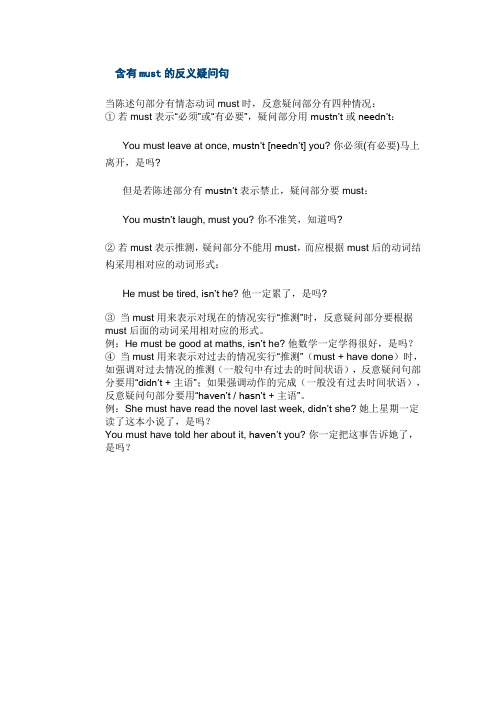
含有must的反义疑问句
当陈述句部分有情态动词must时,反意疑问部分有四种情况:
①若must表示“必须”或“有必要”,疑问部分用mustn’t或needn’t:
You must leave at once, mustn’t[needn’t] you? 你必须(有必要)马上离开,是吗?
但是若陈述部分有mustn’t表示禁止,疑问部分要must:
You mustn’t laugh, must you? 你不准笑,知道吗?
②若must表示推测,疑问部分不能用must,而应根据must后的动词结构采用相对应的动词形式:
He must be tired, isn’t he? 他一定累了,是吗?
③当must用来表示对现在的情况实行“推测”时,反意疑问部分要根据must后面的动词采用相对应的形式。
例:He must be good at maths, isn’t he? 他数学一定学得很好,是吗?
④当must用来表示对过去的情况实行“推测”(must + have done)时,如强调对过去情况的推测(一般句中有过去的时间状语),反意疑问句部分要用“didn’t + 主语”;如果强调动作的完成(一般没有过去时间状语),反意疑问句部分要用“haven’t / hasn’t + 主语”。
例:She must have read the novel last week, didn’t she? 她上星期一定读了这本小说了,是吗?
You must have told her about it, haven’t you? 你一定把这事告诉她了,是吗?。
may must need反义疑问句 exercise用法
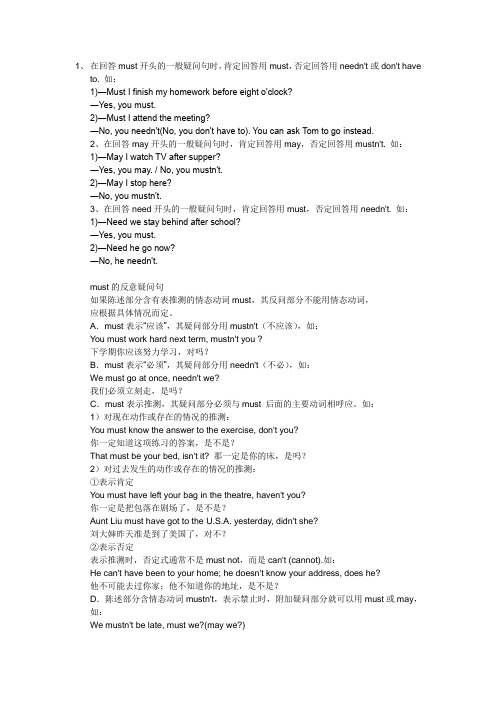
1、在回答must开头的一般疑问句时,肯定回答用must,否定回答用needn't或don't haveto. 如:1)―Must I finish my homework before eight o'clock?―Yes, you must.2)―Must I attend the meeting?―No, you needn't(No, you don't have to). You can ask Tom to go instead.2、在回答may开头的一般疑问句时,肯定回答用may,否定回答用mustn't. 如:1)―May I watch TV after supper?―Yes, you may. / No, you mustn't.2)―May I stop here?―No, you mustn't.3、在回答need开头的一般疑问句时,肯定回答用must,否定回答用needn't. 如:1)―Need we stay behind after school?―Yes, you must.2)―Need he go now?―No, he needn't.must的反意疑问句如果陈述部分含有表推测的情态动词must,其反问部分不能用情态动词,应根据具体情况而定。
A.must表示“应该”,其疑问部分用mustn't(不应该),如:You must work hard next term, mustn't you ?下学期你应该努力学习,对吗?B.must表示“必须”,其疑问部分用needn't(不必),如:We must go at once, needn't we?我们必须立刻走,是吗?C.must表示推测,其疑问部分必须与must 后面的主要动词相呼应。
如:1)对现在动作或存在的情况的推测:You must know the answer to the exercise, don't you?你一定知道这项练习的答案,是不是?That must be your bed, isn't it? 那一定是你的床,是吗?2)对过去发生的动作或存在的情况的推测:①表示肯定You must have left your bag in the theatre, haven't you?你一定是把包落在剧场了,是不是?Aunt Liu must have got to the U.S.A. yesterday, didn't she?刘大婶昨天准是到了美国了,对不?②表示否定表示推测时,否定式通常不是must not,而是can't (cannot).如:He can't have been to your home; he doesn't know your address, does he?他不可能去过你家;他不知道你的地址,是不是?D.陈述部分含情态动词mustn't,表示禁止时,附加疑问部分就可以用must或may,如:We mustn't be late, must we?(may we?)我们不可以迟到,是吗?need带情态动词need的反意疑问句,疑问部分常用need +主语。
must反意疑问句用法总结
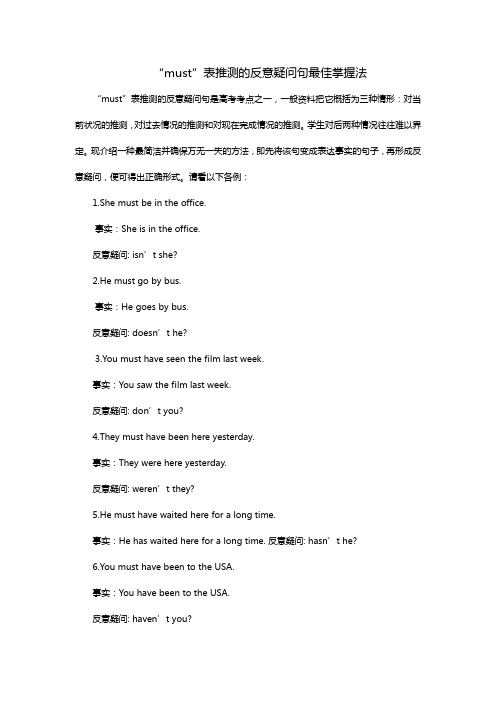
“must”表推测的反意疑问句最佳掌握法“must”表推测的反意疑问句是高考考点之一,一般资料把它概括为三种情形:对当前状况的推测,对过去情况的推测和对现在完成情况的推测。
学生对后两种情况往往难以界定。
现介绍一种最简洁并确保万无一失的方法,即先将该句变成表达事实的句子,再形成反意疑问,便可得出正确形式。
请看以下各例:
1.She must be in the office.
事实:She is in the office.
反意疑问: isn’t she?
2.He must go by bus.
事实:He goes by bus.
反意疑问: doesn’t he?
3.You must have seen the film last week.
事实:You saw the film last week.
反意疑问: don’t you?
4.They must have been here yesterday.
事实:They were here yesterday.
反意疑问: weren’t they?
5.He must have waited here for a long time.
事实:He has waited here for a long time. 反意疑问: hasn’t he?
6.You must have been to the USA.
事实:You have been to the USA.
反意疑问: haven’t you?。
Must的反义疑问句
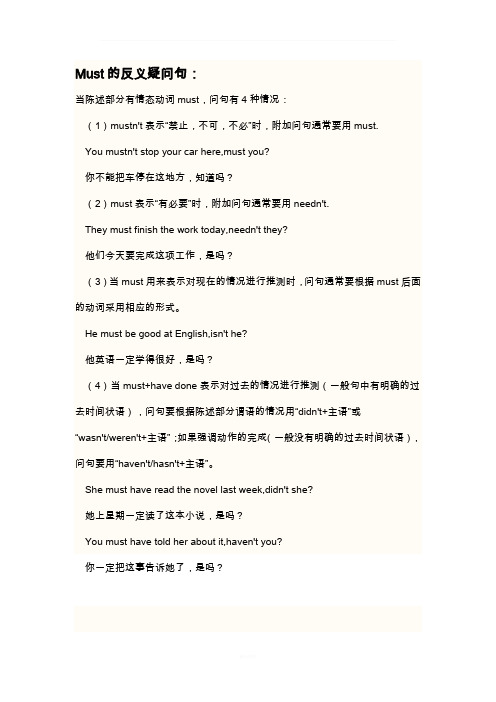
Must的反义疑问句:当陈述部分有情态动词must,问句有4种情况:(1)mustn't表示“禁止,不可,不必”时,附加问句通常要用must.You mustn't stop your car here,must you?你不能把车停在这地方,知道吗?(2)must表示“有必要”时,附加问句通常要用needn't.They must finish the work today,needn't they?他们今天要完成这项工作,是吗?(3)当must用来表示对现在的情况进行推测时,问句通常要根据must后面的动词采用相应的形式。
He must be good at English,isn't he?他英语一定学得很好,是吗?(4)当must+have done表示对过去的情况进行推测(一般句中有明确的过去时间状语),问句要根据陈述部分谓语的情况用“didn't+主语”或“wasn't/weren't+主语”;如果强调动作的完成(一般没有明确的过去时间状语),问句要用“haven't/hasn't+主语”。
She must have read the novel last week,didn't she?她上星期一定读了这本小说,是吗?You must have told her about it,haven't you?你一定把这事告诉她了,是吗?need的反义疑问句:need的用法分为两种,一种是作为情态动词,一种是作为实义动词。
一般而言,need作为情态动词是在否定句(有时为疑问句中),此种情况在反义疑问句中通常为need I或needn't I,而当这句话是一句肯定句是,这里的need就作为实义动词,通常为do you或者是don't you就比如LZ说的句子I needn’t tell you the answer , need I ?这里need为情态动词,前面否定,后用need肯定You need to buy a better dictionary , don’t you ? 这里need为实义动词,前面肯定,所以后面用do的否定形式don't说起will,我不明白LZ是什么意思,与will有关的知识点整理在这里开头为Let's,后面一定用shall +we例:Let's go,shall we开头为Let us,后面一定用will you例:Let us go,will youthink, believe, suppose, imagine, expect等动词后接宾语从句构成的主从复合句在构成反意疑问句时,视情况不同有两种不同的构成方式。
含情态动词must的反义疑问句
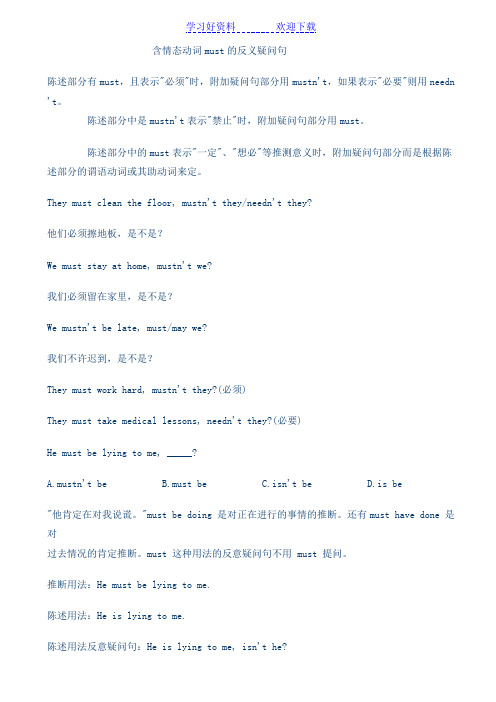
含情态动词must的反义疑问句陈述部分有must,且表示"必须"时,附加疑问句部分用mustn't,如果表示"必要"则用needn 't。
陈述部分中是mustn't表示"禁止"时,附加疑问句部分用must。
陈述部分中的must表示"一定"、"想必"等推测意义时,附加疑问句部分而是根据陈述部分的谓语动词或其助动词来定。
They must clean the floor, mustn't they/needn't they?他们必须擦地板,是不是?We must stay at home, mustn't we?我们必须留在家里,是不是?We mustn't be late, must/may we?我们不许迟到,是不是?They must work hard, mustn't they?(必须)They must take medical lessons, needn't they?(必要)He must be lying to me, _____?A.mustn't beB.must beC.isn't beD.is be"他肯定在对我说谎。
"must be doing 是对正在进行的事情的推断。
还有must have done 是对过去情况的肯定推断。
must 这种用法的反意疑问句不用 must 提问。
推断用法:He must be lying to me.陈述用法:He is lying to me.陈述用法反意疑问句:He is lying to me, isn't he?推断用法反意疑问句:He must be lying to me, isn't he?推断用法:He must have been abroad.陈述用法:He has been abroad.陈述用法反意疑问句:He has been abroad, hasn't he?推断用法反意疑问句:He must have been abroad, hasn't he?推断用法:He must have gone swimming yesterday.陈述用法:He went swimming yesterday.陈述用法反意疑问句:He went swimming yesterday, didn't he?推断用法反意疑问句:He must have gone swimming yesterday, didn't he?He must be a visitor, isn't he?(对现在情况的推测)You must have seen him at his birthday party yesterday, didn't you?(对过去情况的推测,且句中有过去的时间状语)You must have seen him at his birthday party,haven't you?(强调动作的完成)1 带have to 时,附加疑问用do 或have的相应形式, 用do 更常见。
四年级英语反义疑问句练习题30题含答案解析

四年级英语反义疑问句练习题30题含答案解析1.She is a student, isn't she?Yes, she is. 本题考查be 动词的反义疑问句。
前半句是肯定句,be 动词是is,所以后半句用isn't she。
2.They are in the classroom, aren't they?Yes, they are. 前半句是肯定句,be 动词是are,反义疑问句用aren't they。
3.He is a teacher, isn't he?Yes, he is. 肯定句中be 动词是is,反义疑问句用isn't he。
4.We are friends, aren't we?Yes, we are. 肯定句be 动词是are,反义疑问句用aren't we。
5.The book is on the desk, isn't it?Yes, it is. 肯定句be 动词是is,反义疑问句用isn't it。
6.She is happy, isn't she?Yes, she is. 肯定句be 动词是is,反义疑问句用isn't she。
7.They are playing games, aren't they?Yes, they are. 肯定句be 动词是are,反义疑问句用aren't they。
8.He is reading a book, isn't he?Yes, he is. 肯定句be 动词是is,反义疑问句用isn't he。
9.We are having lunch, aren't we?Yes, we are. 肯定句be 动词是are,反义疑问句用aren't we。
10.The girl is singing, isn't she?Yes, she is. 肯定句be 动词是is,反义疑问句用isn't she。
反义疑问句的情态动词搭配

反义疑问句的情态动词搭配反义疑问句是英语中常见的一种语法结构,通常由一个陈述句和一个疑问句构成,用来表示对陈述的疑问或确认。
而在反义疑问句中,情态动词起着重要的作用。
情态动词在与陈述句的主语和谓语形成反义疑问句时具有特定的搭配规律,本文将介绍常用的情态动词搭配及其用法。
1. "can"和"can't"- She can swim, can't she?- He can't swim, can he?这种搭配主要用于对能力或技能的确认或疑问。
"can"表示能力或允许的情态动词,用于陈述句;"can't"则表示否定,用于疑问句。
在反义疑问句中,情态动词与陈述句的主语和谓语形成反义关系。
2. "will"和"won't"- She will come to the party, won't she?- He won't come to the party, will he?这种搭配主要用于对意愿或决心的确认或疑问。
"will"表示意愿或将来的情态动词,用于陈述句;"won't"则表示否定,用于疑问句。
在反义疑问句中,情态动词与陈述句的主语和谓语形成反义关系。
3. "should"和"shouldn't"- You should study harder, shouldn't you?- You shouldn't study harder, should you?这种搭配主要用于对建议或责任的确认或疑问。
"should"表示应该或建议的情态动词,用于陈述句;"shouldn't"则表示否定,用于疑问句。
反义疑问句must的用法及回答

反义疑问句must的用法及回答解析反义疑问句是一种特殊的疑问句,它由一个陈述句和一个与之相反意义的简短疑问句构成,用来表示说话人对某事的看法或态度,或者征求对方的意见或同意。
反义疑问句中,如果陈述部分有情态动词must,那么根据must 的不同含义和语气,反意疑问部分有四种可能的形式:mustn't, needn't, didn't或haven't/hasn't。
本文将分别介绍这四种情况的用法及回答,并给出一些例句和练习。
一、must表示“必须”或“有必要”当陈述部分的must表示“必须”或“有必要”时,反意疑问部分通常用mustn't或needn't。
这两种形式都可以表示说话人对陈述部分的肯定或强调,但是mustn't更加强烈,而needn't更加委婉。
例如:You must leave at once, mustn't you? 你必须马上离开,是吗?(强调必要性)You must leave at once, needn't you? 你必须马上离开,是吗?(询问是否必要)回答这种反义疑问句时,如果同意陈述部分,可以用Yes, I must. 或Yes, I do.;如果不同意陈述部分,可以用No, I needn't. 或No, I don't have to.。
例如:You must leave at once, mustn't you? 你必须马上离开,是吗?Yes, I must. 是的,我必须。
No, I needn't. 不,我不必。
No, I don't have to. 不,我不用。
二、must表示“推测”当陈述部分的must表示“推测”时,反意疑问部分不能用must,而应根据must后面的动词结构采用相应的动词形式。
例如:He must be tired, isn't he? 他一定累了,是吗?(根据be动词用isn't)They must have arrived by now, haven't they? 他们现在一定已经到了,是吗?(根据have done结构用haven't)回答这种反义疑问句时,如果同意陈述部分,可以用Yes, he is. 或Yes, they have.;如果不同意陈述部分,可以用No, he isn't. 或No, they haven't.。
五年级英语反义疑问句单选题40题
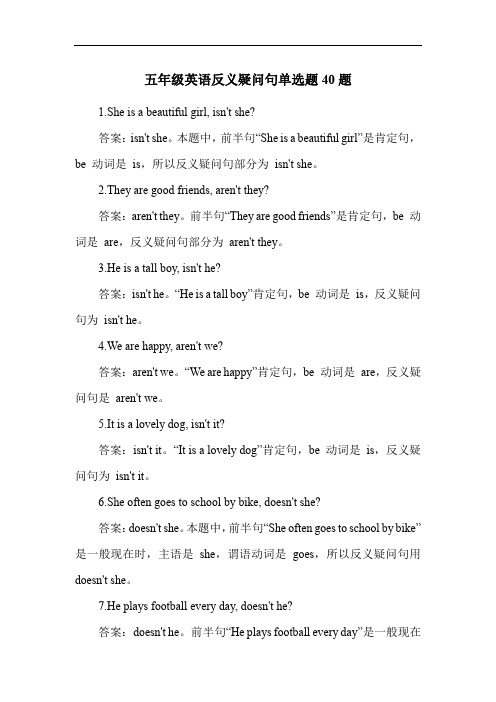
五年级英语反义疑问句单选题40题1.She is a beautiful girl, isn't she?答案:isn't she。
本题中,前半句“She is a beautiful girl”是肯定句,be 动词是is,所以反义疑问句部分为isn't she。
2.They are good friends, aren't they?答案:aren't they。
前半句“They are good friends”是肯定句,be 动词是are,反义疑问句部分为aren't they。
3.He is a tall boy, isn't he?答案:isn't he。
“He is a tall boy”肯定句,be 动词是is,反义疑问句为isn't he。
4.We are happy, aren't we?答案:aren't we。
“We are happy”肯定句,be 动词是are,反义疑问句是aren't we。
5.It is a lovely dog, isn't it?答案:isn't it。
“It is a lovely dog”肯定句,be 动词是is,反义疑问句为isn't it。
6.She often goes to school by bike, doesn't she?答案:doesn't she。
本题中,前半句“She often goes to school by bike”是一般现在时,主语是she,谓语动词是goes,所以反义疑问句用doesn't she。
7.He plays football every day, doesn't he?答案:doesn't he。
前半句“He plays football every day”是一般现在时,主语是he,谓语动词是plays,反义疑问句用doesn't he。
反义疑问句的特殊用法

A.当need 是及物动词的时候A fence needs the support of three stakes,doesn’t it?B.当 need 是情态动词的时候You needn’t come tomorrow morning,need you?2.must 的反义疑问句A.当must 表推测时You must be tired,aren’t you?must have done对已发生的过去情况的推测.若陈述句谓语部分有“must have done”,而且有表示过去的时间状语,问句部分用didn't;若没有表示过去的时间状语,问句部分用haven't或hasn't。
You must have made the mistake,haven’t you?They must have stayed at home last night,didn’t they?B.当must 为情态动词时You mustn’t walk on grass,must you?3.不定代词的反义疑问句A.指人的不定代词Everyone is having a good time,aren’t they?B.指物的不定代词1.Nothing serious happened,did it?2.Everything goes well,doesn’t it?4.判断反义主句还是从句A.主语是第I,从句反问I suppose you are not going today,are you?B.主语不是I,主句反问。
有些从句即使是I,但动词如果是tell,还是要主句反问。
I told them not everybody could do it,didn’t I?5.There used to be的反义疑问句There used to be bus stop on that corner,didn’t there?Pass me the dictionary,will you? Let’s go,shall we?Let us go,will you?。
高一英语疑问句反义疑问句试题答案及解析
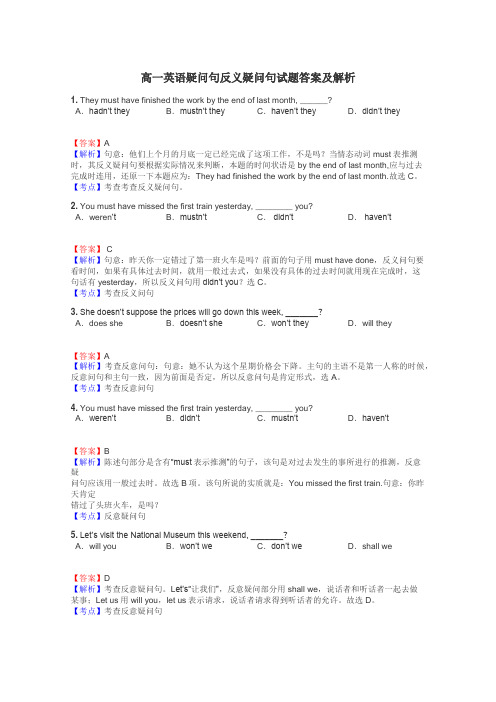
高一英语疑问句反义疑问句试题答案及解析1. They must have finished the work by the end of last month, ______?A.hadn’t they B.mustn’t they C.haven’t they D.didn’t they【答案】A【解析】句意:他们上个月的月底一定已经完成了这项工作,不是吗?当情态动词must表推测时,其反义疑问句要根据实际情况来判断,本题的时间状语是by the end of last month,应与过去完成时连用,还原一下本题应为:They had finished the work by the end of last month.故选C。
【考点】考查考查反义疑问句。
2. You must have missed the first train yesterday, ________ you?A.weren’t B.mustn’t C.didn’t D.haven’t【答案】 C【解析】句意:昨天你一定错过了第一班火车是吗?前面的句子用must have done,反义问句要看时间,如果有具体过去时间,就用一般过去式,如果没有具体的过去时间就用现在完成时,这句话有yesterday,所以反义问句用didn’t you?选C。
【考点】考查反义问句3.She doesn’t suppose the prices will go down this week, _______?A.does she B.doesn’t she C.won’t they D.will they【答案】A【解析】考查反意问句:句意:她不认为这个星期价格会下降。
主句的主语不是第一人称的时候,反意问句和主句一致,因为前面是否定,所以反意问句是肯定形式,选A。
【考点】考查反意问句4. You must have missed the first train yesterday, ________ you?A.weren’t B.didn’t C.mustn’t D.haven’t【答案】B【解析】陈述句部分是含有“must表示推测”的句子,该句是对过去发生的事所进行的推测,反意疑问句应该用一般过去时。
反义疑问句的讲解及练习(含 答案)

初中英语反意疑问句的具体用法1) 陈述部分的主语是I,疑问部分要用 aren't I.I'm as tall as your sister,aren't I?2) 陈述部分的谓语是wish,疑问部分要用may +主语。
I wish to have a word with you, may I?3) 陈述部分用 no, nothing, nobody, never, few, seldom,hardly, rarely, little等否定含义的词时,疑问部分用肯定含义。
The Swede made no answer, did he / she?Some plants never blown (开花), do they ?4) 含有ought to 的反意疑问句,陈述部分是肯定的,疑问部分用shouldn't / oughtn't +主语。
He ought to know what to do, oughtn't he? / shouldn't he?5) 陈述部分有have to +v. (had to + v.),疑问部分常用don't +主语(didn't +主语)。
We have to get there at eight tomorrow, don't we?6) 陈述部分的谓语是used to 时,疑问部分用didn't +主语或usedn't +主语。
He used to take pictures there, didn't he? / usedn't he?7) 陈述部分有had better + v. 疑问句部分用hadn't you?You'd better read it by yourself, hadn't you?8) 陈述部分有would rather +v.,疑问部分多用 wouldn't +主语。
反义疑问句

反义疑问句的12种特殊句型1.在由祈使句+疑问部分构成的反义疑问句中,疑问部分通常用will you, won’t you, would you,有时也可以用can you , can’t you, why don’t you, could you等,但不用do,即使祈使句中有助动词do 时也是这样,Pass me the dictionary, will (would)you?Don’t do that again, will you?在含有let的祈使句后的反义疑问句部分,如果let 的宾语us包括听者(常写为let’s)时用shall we,不包括听者(常写为let us)时用will you. Let的宾语是me时,要根据意思用will you或may I 。
let 的宾语是第三人称时用will you .Let him speak first,will you ?2.当陈述部分带有情态动词must 时,反义疑问部分要根据Must的意思不同而有所变化。
如果must 表示必须,有必要时,反义疑问部分用musn’t 或neen’t .如I must hand in my exercise book now,must’t I (needn’t I )?如果must n’t 表示禁止时,疑问部分一般用mustYou mustn’t take the magazine out of the reading room,must you ?若must 表示想必,一定等推测意义时,则疑问部分不用must,而要根据must 之后的动词结构及含义使用相应的动词形式。
如:He must be your English teacher, isn’t he ?Chinese must have the largest number of speakers, doesn’t it ?You must have read read the book yesterday , didn’t he?3.当陈述部分的主语为nothing , anything, everything等不定代词时,反义疑问部分主语用it ,如:Nothing could prevent him from going there, could it?如果陈述部分的主语为nobody,somebody,none,someone,no one,anyone,anybody,everyone等不定代词,反义疑问部分主语用they 或he,如:Somebody took my umbrella away yesterday, didn’t they/he ?4.当陈述部分带有that从句作宾语时,反义疑问部分应与主句的主语和谓语一致。
- 1、下载文档前请自行甄别文档内容的完整性,平台不提供额外的编辑、内容补充、找答案等附加服务。
- 2、"仅部分预览"的文档,不可在线预览部分如存在完整性等问题,可反馈申请退款(可完整预览的文档不适用该条件!)。
- 3、如文档侵犯您的权益,请联系客服反馈,我们会尽快为您处理(人工客服工作时间:9:00-18:30)。
含情态动词must 的反义疑问句
陈述部分有must,且表示”必须”时,附加疑问句部分用must n't,如果表示"必要"则用needn't。
陈述部分中是mustn't 表示"禁止"时,附加疑问句部分用must。
陈述部分中的must 表示"一定"、"想必"等推测意义时,附加疑问句部分而是根据陈述部分的谓语动词或其助动词来定。
They must clean the floor, mustn't they/needn't they?
他们必须擦地板,是不是?
We must stay at home, mustn't we?
我们必须留在家里,是不是?
We mustn't be late, must/may we?
我们不许迟到,是不是?
They must work hard, must n't they ?(必须)
They must take medical less ons, n eed n't they?必要)
He must be lying to me, ___?
A. mustn't be
B. must be
C. isn't be
D. is be
"他肯定在对我说谎。
"must be doing 是对正在进行的事情的推断。
还有must have done 是对
过去情况的肯定推断。
must这种用法的反意疑问句不用must提问。
推断用法:
He must be lying to me.
xx 用法:
He is lying to me.
xx 用法反意疑问句:
He is lying to me, isn't he? 推断用法反意疑问句:
He must be lying to me, isn't he? 推断用法:
He must have been abroad.
xx 用法:
He has been abroad.
xx 用法反意疑问句:
He has been abroad, hasn't he? 推断用法反意疑问句:
He must have been abroad, hasn't he? 推断用法:
He must have gone swimming yesterday.
xx 用法:
He went swimming yesterday.
xx 用法反意疑问句:
He went swimming yesterday, didn't he? 推断用法反意疑问句:
He must have gone swimming yesterday, didn't he?He must be a visitor, isn't he?(对现在情况的推测)
You must have see n him at his birthday party yesterday, did n't you?对过去情况的推测,且句中有过去的时间状语)
You must have seen him at his birthday party,haven't you?强调动作的完成)1 带have to时,附加疑问用do或have的相应形式,用do更常见。
You don ' t have to go to school on Sundays , do you ?
We have to work today , don 't we ? (haven ' t we ?)
2 带must 时
A表示必须”附加疑问部分用mustn 't
We must work hard , mustn ' t we ?
B表示有必要”时,附加疑问部分用needn ' t.
The teacher must show concern for each pupil , needn ' t he ?
C表示推测”时,附加疑问部分要与陈述部分的谓语动词相呼应。
He must be a teacher, isn ' t he ?
Dmust + have + do ne是对过去情况的推测,当陈述部分没有明确的表示过去的时间状语时,附加疑问要用have的相应形式;当陈述部分有明确的过去时间状语时,附加疑问要用过去时。
You must have lived here for a long time , haven ' t you ?
You must have seen him yesterday , didn ' t you ?
E 当陈述部分是must not ,表示“一定不要”、“禁止”时,附加疑问除用must 外,还可以用may.
I must not tell him , must I ? ( may I ?)
3带used to时,附加疑问用usedn '或didn '但口语中倾向于后者。
Thereused to be an apple tree in the garden , didn 't there ? (usedn 带need 时,附加疑问用do 或need ,应该与陈述部分need 用法相呼应。
I needn 't tell you the answer , need I ?
You need to buy a better dictionary , don 't you ?
5 带ought to 时,附加疑问用ought. ,但在美国英语中用should
We ought to help each other , oughtn 't we ? / shouldn 't we ?。
